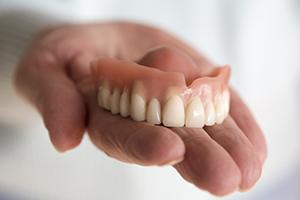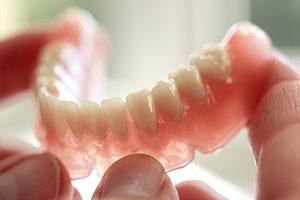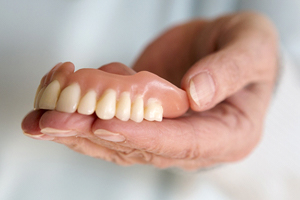Carrollton Dentures & Partials

Right now, there are millions of Americans with multiple missing teeth, and if this includes you, then you’re likely well aware of the problems they can cause every single day. Eating, speaking, and even smiling can feel awkward and uncomfortable, and because your lips and facial muscles no longer have the teeth’s support, they sag, which creates wrinkles. If any of these issues are affecting you, dentures can help them go away.
At Aegis Dental, we can provide custom-made dentures that will fill in the gaps and restore your confidence all at the same time. Whether you are missing a few teeth or all of them, we’re able to help, so don’t hesitate to contact us today.
The Types of Dentures We Offer

- Partial Dentures: These are designed to replace numerous missing teeth and fit in seamlessly among any remaining ones (like a piece of a puzzle). They are typically made of ceramic, or acrylic, teeth attached to a gum-colored base, and they are held in place using small metal clasps, or biocompatible thermoplastics, that attach to the neighboring teeth.
- Full Dentures: These can be used to replace an entire row of teeth. They also consist of ceramic, or acrylic, teeth and a gum-colored base, but they are placed directly onto the gums. They are secured using either natural suction or a bit of denture adhesive.
- Implant-Retained Dentures: While they may look like regular dentures above the gum line, it’s what lies below that makes them truly special. The prosthetic snaps directly onto multiple dental implants placed within the mouth. This makes them much more stable than your typical removable denture, plus they can be trusted to last for much longer as well.
The Process to Get Dentures

Everything will start with an oral exam performed by Dr. Chandy where she’ll look at the current state of your teeth, gums, as well as your jaw alignment. After determining that dentures are indeed the best solution for your tooth loss, she may choose to remove any damaged/decayed teeth before starting to design your prosthetic.
Once you have healed from any necessary extractions, she will make a series of mock-up dentures that you’ll try on over the course of a few appointments. These will help you find the look and fit that is right for you. When this is determined, the model will be sent to a dental lab to manufacture your final dentures. During this process, you’ll be fitted for an immediate, or temporary denture to make sure you’re never without your teeth.
Adjusting to New Dentures

It may take you a few weeks to become comfortable with your new dentures, and a bit of soreness in your mouth and gums is perfectly normal. Eating and speaking with them may feel awkward initially, but you can speed up the adjustment process by sticking to a soft diet at first and reading out loud while wearing your dentures. After a while, they will begin to feel normal, and you’ll be so glad that you got them.
Maintaining Dentures

Just like real teeth, dentures need to be maintained in order to make them last. A few tips to take care of your denture include:
- Brush them every day after meals. You should use a soft-bristled brush and a special denture toothpaste to clean them, as regular toothpaste is too abrasive and may cause scratches.
- Be sure to clean your gums as well so food particles can’t become trapped between them and the dentures.
- At night, take your dentures out to allow your gums to rest, and place them in either water or a denture cleaning solution.
- Be sure to attend regular checkups with Aegis Dental so we can monitor the health of your mouth and the condition of your dentures as well.
With dentures from Aegis Dental, you’ll be able to enjoy your favorite foods and smile with confidence again. To learn more about our denture solutions and what they can do for you, contact us today.
Dentures FAQs

Are you considering dentures in Carrollton to replace your missing teeth? These long-time restorative prosthetics offer patients a multitude of benefits from affordability to reliability, but they also pose a lot of questions, especially if you’ve never worn them before. Whether you’re a first-time denture-wearer or something doesn’t feel right and you are looking for an answer to your problem, Dr. Chandy has provided some frequently asked questions about dentures for you to review.
How often will I need to replace my dentures?
Unfortunately, the dentures you receive the first time you are in our office will not last forever. On average, dentures should be replaced every 5-8 years. The reason is that your face and jaw will change shape over the years and cause your prosthetic to no longer fit as it should. As a result, you can have it adjusted and relined but only so many times. Once your dentures can no longer be altered to fit your smile, it will be necessary to have them fully replaced. This will ensure a proper and comfortable fit.
How often will I need to see the dentist?
It is a common misconception that once you have dentures, there is no need to see your dentist anymore. This is not true and should not be considered “worthwhile” advice. Dr. Chandy will need to continue seeing you regularly (every six months) for dental checkups and cleanings for partial dentures and at least an annual checkup and oral cancer screening for those with complete dentures. This will ensure that your dentures are still in good shape and causing no irritation to your gums, cheeks, or oral cavity.
Can I sleep in my dentures?
While you can sleep in your dentures, it is unadvised that you do so. The reason is that dentures should be soaked each night, allowing them to stay moist and clean while giving your gums and bone a rest from daily wear. You shouldn’t wear your dentures a full 24 hours without cleaning them, so nighttime is a great opportunity to maintain your smile and ensure a healthy, refreshing start to the next day.
When should I reline my dentures?
If you maintain regular checkups with Dr. Chandy, it is likely that she will be able to tell if your dentures are in need of relining. When a change or shift if your jaw occurs, you will notice that your dentures no longer feel right in your mouth. As a result, you will need to bring them in and have us refit the base. This will create a more tightly fit, so your dentures sit comfortably within your mouth and reduces the chances of experiencing accidental slippage or having your dentures fall out.
What should I expect to spend on dentures?
This is dependent on your individual case. Not all patients are the same, so you may only need a top or bottom denture instead of both. No matter if you need to replace an entire row or both in your mouth, there are various factors that can determine the overall cost of your restorative dental work. Some of these factors include:
- How many dentures you will need
- Materials used
- The complexity of your treatment
- If you require any pre-denture placement dental work (i.e. tooth extraction)
- Timeline of treatment
It will be necessary for you to review your dental insurance policy with our staff to determine how much you can expect to pay out of pocket for your treatment.

